Related Research Articles
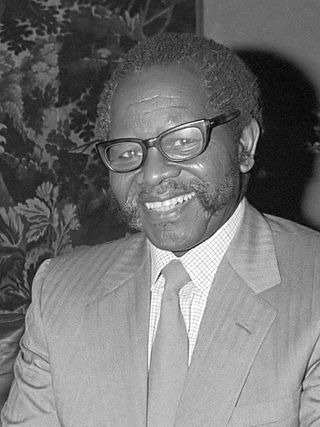
Oliver Reginald Kaizana Tambo was a South African anti-apartheid politician and activist who served as President of the African National Congress (ANC) from 1967 to 1991.
Abraham Louis Fischer was a South African Communist lawyer of Afrikaner descent with partial Anglo-African ancestry from his paternal grandmother, notable for anti-apartheid activism and for the legal defence of anti-apartheid figures, including Nelson Mandela, at the Rivonia Trial. Following the trial he was himself put on trial accused of furthering communism. He was sentenced to life imprisonment, and diagnosed with cancer while in prison. The South African Prisons Act was extended to include his brother's house in Bloemfontein where he died two months later.
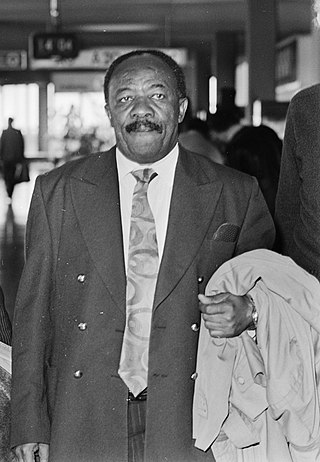
Alfred Baphethuxolo Nzo was a South African politician. He served as the longest-standing secretary-general of the African National Congress. He occupied this position (ANC) between 1969 and 1991. He was also the South African minister of foreign affairs from 1994 to 1999. He was also the first black health inspector in the country. The Alfred Nzo Award is now awarded to deserving health practitioners in South Africa.
Frederik van Zyl Slabbert was a South African political analyst, businessman and politician. He is best known for having been the leader of the official opposition – the Progressive Federal Party (PFP) – in the House of Assembly from 1979 to 1986.
Jeremy Patrick Cronin is a South African writer, author, and noted poet. A longtime activist in politics, Cronin is a member of the South African Communist Party and a former member of the National Executive Committee of the African National Congress. He served as the South African Deputy Minister of Public Works from 2012 until his retirement in 2019.
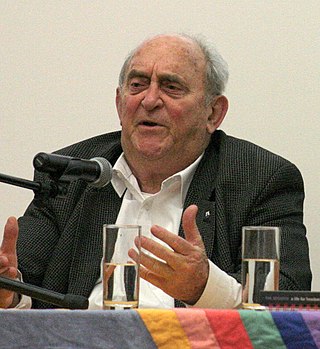
Denis Theodore Goldberg was a South African social campaigner, who was active in the struggle against apartheid. He was accused No. 3 in the Rivonia Trial, alongside the better-known Nelson Mandela and Walter Sisulu, where he was also the youngest of the defendants. He was imprisoned for 22 years, along with other key members of the anti-apartheid movement in South Africa. After his release in 1985 he continued to campaign against apartheid from his base in London with his family, until the apartheid system was fully abolished with the 1994 election. He returned to South Africa in 2002 and founded the non-profit Denis Goldberg Legacy Foundation Trust in 2015. He was diagnosed with lung cancer in July 2019, and died in Cape Town on 29 April 2020.
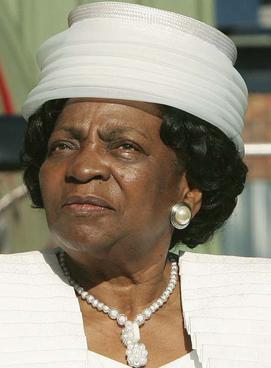
Adelaide Frances Tambo was a South African anti-apartheid activist and former political exile.
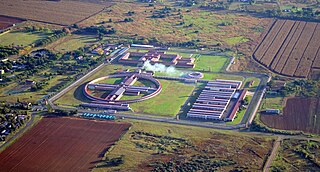
Prisons in South Africa are run by the Department of Correctional Services. According to the ministry, there are approximately 34,000 employees of the department running 240 prisons. In those prisons are nearly 156,000 inmates as of August 2013. The prisons include minimum, medium and maximum security facilities. Since 2019, the Minister of Correctional Services has been Ronald Lamola.
Steve Vukhile Tshwete was a South African politician and activist with the African National Congress. Involved in Umkhonto we Sizwe, Tshwete was imprisoned by the apartheid authorities on Robben Island from February 1964 to 1978. Tshwete resumed activities with the ANC and become a regional coordinator for the new United Democratic Front. He later lived in exile in Zambia with the ANC. After the first free elections in South Africa in 1994, he became the new government's first Sports Minister and later was Minister of Safety and Security.

Timothy Peter Jenkin is a South African writer, former anti-apartheid activist and political prisoner. He is best known for his 1979 escape from Pretoria Local Prison, along with Stephen Lee and Alex Moumbaris.
Breakout is a Canadian television series that aired on the National Geographic Channel throughout the world. It dramatizes real life prison breakouts. The series premiered on March 28, 2010, and aired its last episode on March 23, 2013. It was listed as a Canada/UK co-production.
Pretoria Central Prison, renamed Kgosi Mampuru II Management Area by former President Jacob Zuma on 13 April 2013 and sometimes referred to as Kgosi Mampuru II Correctional Services is a large prison in central Pretoria, within the City of Tshwane in South Africa. It is operated by the South African Department of Correctional Services.
Baruch Hirson was a South African political activist, academic, author, and historian, who was jailed for nine years in apartheid-era South Africa before moving to England in 1973. He was co-founder of the critical journal Searchlight South Africa, and in 1991, a critic of what he referred to as Stalinist methods used by the African National Congress (ANC).

Raymond Suttner is South African activist, academic, journalist and public figure.

Annie Silinga (1910-1984) was a South African anti-pass laws and anti-apartheid political activist. She is known for her role as the Cape Town African National Congress Women's League President, a leader in the 1956 anti-pass Women's March to the Union Buildings in Pretoria, South Africa and the only African woman in the 1956 treason trial in South Africa.
Parmananthan "Prema" Naidoo is a member of the African National Congress and former Chief Whip of Council and of the majority party in the Johannesburg Metro.

Escape from Pretoria is a 2020 Australian prison film co-written and directed by Francis Annan, based on the real-life prison escape by three political prisoners in South Africa in 1979, starring Daniel Radcliffe and Daniel Webber. It is based on the 2003 book Inside Out: Escape from Pretoria Prison by Tim Jenkin, one of the escapees.
Alexandre Moumbaris is a political activist and former political prisoner. He was born in Egypt to Greek parents, grew up in Australia, lived and worked in the UK, was imprisoned in South Africa and now lives in France. He is known for his political activism against the apartheid régime in South Africa in the 1970s, and his subsequent incarceration in, and 1979 escape from, Pretoria Local Prison with Tim Jenkin and Stephen Lee. He returned to France after his escape.

Operation Vula was a secret domestic programme of the African National Congress (ANC) during the final years of apartheid in South Africa. Initiated in 1986 at the ANC headquarters in Lusaka and launched in South Africa in 1988, its operatives infiltrated weapons and banned ANC leaders into the country, in order to establish an underground network linking domestic activist structures with the ANC in exile. It was responsible for facilitating the only direct line of communication between ANC headquarters and Nelson Mandela, who at the time was imprisoned and was discussing a negotiated settlement with the government on the ANC's behalf. The operation was disbanded in 1990, after its existence had been publicly revealed and eight of its leaders charged under the Internal Security Act with terrorism and plotting an armed insurrection.
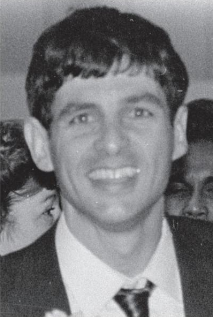
David Rabkin was a South African anti-apartheid activist known for publishing subversive pamphlets. He served seven years of a ten-year sentence for his anti-apartheid activities. After his accidental death during military training in Angola, he received a hero's burial in Luanda.
References
- ↑ Jenkin 1987 , pp. 6–7
- ↑ Jenkin 1987 , pp. 9–13
- ↑ Jenkin 1987 , pp. 13–14
- 1 2 3 "Stephen Bernard Lee". South African History Online. 28 September 2011. Retrieved 20 March 2019.
- ↑ Jenkin 1987 , pp. 17–22
- ↑ Jenkin 1987 , p. 23
- ↑ Jenkin 1987 , p. 24
- ↑ Jenkin 1987 , p. 25
- ↑ Jenkin 1987 , pp. 26–29
- ↑ Jenkin 1987 , pp. 30–31
- ↑ Parry, Tom (19 April 2013). "Pretoria Prison break: Amazing story of the daring men who escaped notorious apartheid regime jail". Mirror. Retrieved 26 March 2019.
- 1 2 Breakout. YouTube (video). Tim Jenkin. 30 July 2013. Retrieved 26 March 2019.
- ↑ Jenkin 1987 , pp. 31–38
- ↑ Jenkin 1987 , pp. 44–45
- 1 2 Jenkin 1987 , p. 55
- ↑ Jenkin 1987 , p. 60
- ↑ Jenkin 1987 , pp. 64–65, 69
- 1 2 Jenkin 1987
- ↑ Jenkin, Tim (1978). Inside Out: Escape from Pretoria Prison (New ed.). Johannesburg: Jacana. ISBN 9781919931500. OCLC 653065100 . Retrieved 13 March 2019– via Worldcat.
- ↑ Tambo, Oliver (2 January 1980). "Press Conference by O. R. Tambo, Introducing Alexandre Moumbaris, Stephen Lee and Timothy Jenkin who Escaped from Prison in South Africa". South African History Online. Lusaka. Retrieved 20 March 2019.
- ↑ Jenkin 1987 , p. 187
- ↑ Jenkin 1987 , p. 192
- ↑ Gray, Madi. "Chapter 9: To build solidarity - that was my task". South African History Online. Retrieved 20 March 2019.
In Denis Goldberg : freedom fighter and humanist, edited by David Kenvyn (2014)
- ↑ Mitchell, Robert (18 May 2017). "Daniel Radcliffe to Star in Prison-Break Drama 'Escape From Pretoria'". Variety. Penske Business Media, LLC. Retrieved 1 October 2017.
- ↑ Grater, Tom. "Sam Neill joins Daniel Radcliffe in 'Escape From Pretoria'". Screen Daily. Retrieved 8 March 2019.
- ↑ Sutton, Malcolm (13 March 2019). "Adelaide transformed into apartheid-era Cape Town for Escape From Pretoria filming". Australian Broadcasting Corporation News. Retrieved 13 March 2019.
- ↑ 7News Adelaide (17 February 2019). "Daniel Radcliffe touches down in Adelaide for new movie" . Retrieved 8 March 2019.